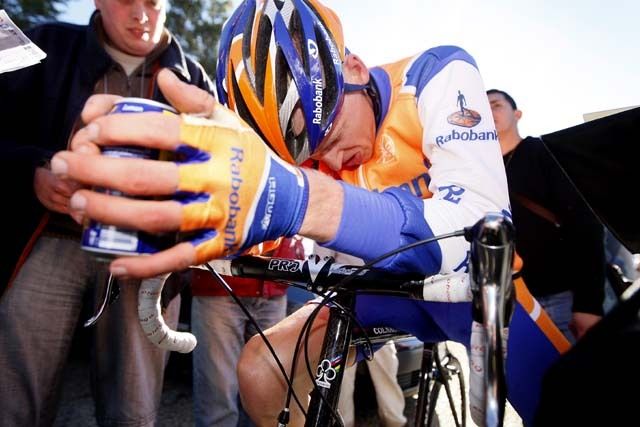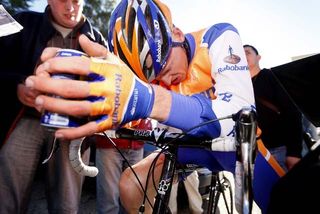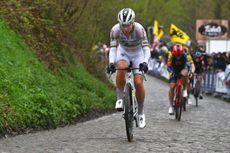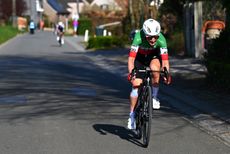GESINK FINDS IT LONELY AT THE TOP

Paris-Nice was turned on its head yesterday. Robert Gesink, so strong on the climb of Mont Ventoux on Thursday, was left isolated by attacks on the descent of the Col du Tanneron. CW explains where the Dutchman lost the race, and how his rivals exposed his weaknesses perfectly.
WHAT HAPPENED TO GESINK?
A combination of two things cost Robert Gesink the race lead yesterday ? fatigue and inexperience.
The Dutchman is still only 21 years old, and while he is as strong as anybody on a single day, especially riding uphill, he hasn?t developed the physical maturity and resilience that would enable him to ride strongly day after day. He complained of feeling tired on the ascent of the Tanneron, whereas two days previously he had blown virtually the entire field off his back wheel on the much harder Ventoux.
But it was on the downhill where his inexperience cost him. The descent of the Tanneron involves a long section of false flat, where he allowed gaps to open in front of him. And then it becomes very technical, with corners ranging from shallow to sharp. When he saw Frank Schleck crash in front of him, he completely lost his nerve, braking far too hard into the corners, and all but taking his feet out on the sharper bends.
Meanwhile, Davide Rebellin, who has ridden Paris-Nice many times, was the opposite. He was confident and fresh, the opposite of Gesink.
Gesink had to ride alone into the headwind, with little help, in a pursuit match against a very well-organised and motivated lead group. He didn?t stand a chance.
Get The Leadout Newsletter
The latest race content, interviews, features, reviews and expert buying guides, direct to your inbox!
WHY WAS GESINK LEFT ON HIS OWN?
At the top of the Ventoux, Gesink looked invincible.
But the next day exposed chinks in the Rabobank armour. They let a dangerous, and large break go on a rolling stage. Large breaks are much more difficult to bring back - there were 15 strong riders sharing the work ahead, while Rabobank, had less than half that manpower to chase them down. Three of the riders in orange had been dropped earlier in the stage, which made their task an impossible one.
When the lead reached three minutes, Gerolsteiner had to go and help out, to protect Rebellin?s position in the overall. Carlos Barredo, the best-placed rider overall, was only four minutes down ? if it had been left to Rabobank, the Spaniard would have taken over the race lead.
Gesink?s rivals would have noticed that Rabobank were vulnerable, and they put the Dutch team on the rack on the Col du Tanneron the next day.
On the climb, Caisse d?Epargne, Quick Step and Silence-Lotto rode a very hard tempo, dropping all the Rabobank riders and leaving Gesink on his own. They still couldn?t drop him going uphill, but they made short work of him on the descent. With only 15 kilometres from the base of the climb to the finish, and the wind blowing in the face of the riders, Rebellin and Rinaldo Nocentini knew that if Gesink was dropped, the gap would only get larger on the run-in.
WHAT HAPPENED IN THE SPRINT?
The lead group comprised Bobby Julich, who had been way in a break all day, Damiano Cunego and Sylvain Chavanel, who were well down overall, but fancied the stage win, and overall contenders Nocentini, Rebellin and Luis Leon Sanchez.
Julich ? a renowned non-sprinter ? went first, at a kilometre to go.
This was the right thing to do ? he gambled on the others being too preoccupied with gaining time on Gesink to go after him. He knew neither Rebellin nor Nocentini, separated by three seconds overall, would chase him down, since neither would want to gift the other a time bonus. Cunego and Chavanel, eyeing the stage win, were in a similar situation ? whichever one chased would give the other a free ride to the line.
Unfortunately for Julich, Sanchez chased him down, fancying a repeat of last year?s win in the same stage. Chavanel was right on him, and then attacked. Sanchez needed a breather, Julich was spent, and Cunego hesitated, while Rebellin and Nocentini drifted off the back, neither still willing to tow the other to a time bonus.
Cunego?s hesitation lost him the stage ? it had played out perfectly for Chavanel, who has been the most aggressive rider of this year?s Paris-Nice.

Robert Gesink slumps over his handlebars after a long, fruitless chase. By Luc Claessen
| STAGE SIX WINNERS ? |
Davide Rebellin
The wily old Italian sensed Gesink?s vulnerability, and rode a perfect tactical race to go into the race lead.
Rinaldo Nocentini
Now second overall, by only three seconds, he?ll be making his own plans for today?s stage into Nice. One slip by Rebellin, and the yellow jersey is his.
Sylvain Chavanel
Has been attacking and attacking all week. A stage win and a place in the top 10 have made him the darling of the French media.
| ? AND LOSERS |
Robert Gesink
Found out just how lonely it is at the top.
Rabobank
If just one or two of Gesink?s team mates had made it over the top of the Tanneron with him, the race could have been saved.
Yaroslav Popovych
Finished ahead of Gesink, but missed the vital move on the Tanneron.
Damiano Cunego
The favourite for the sprint fluffed his opportunity by not following Chavanel.

Thank you for reading 20 articles this month* Join now for unlimited access
Enjoy your first month for just £1 / $1 / €1
*Read 5 free articles per month without a subscription

Join now for unlimited access
Try first month for just £1 / $1 / €1
Edward Pickering is a writer and journalist, editor of Pro Cycling and previous deputy editor of Cycle Sport. As well as contributing to Cycling Weekly, he has also written for the likes of the New York Times. His book, The Race Against Time, saw him shortlisted for Best New Writer at the British Sports Book Awards. A self-confessed 'fair weather cyclist', Pickering also enjoys running.
-
 Mathieu van der Poel's history charge, the crucial Oude Kwaremont, and Lotte Kopecky time: Everything you need to know about the Tour of Flanders
Mathieu van der Poel's history charge, the crucial Oude Kwaremont, and Lotte Kopecky time: Everything you need to know about the Tour of FlandersThe Tour of Flanders finally comes on Sunday, here's how to watch, who to watch, and what to watch out for
By Adam Becket Published
-
 Elisa Longo Borghini emerges as Flanders favourite with Dwars door Vlaanderen victory
Elisa Longo Borghini emerges as Flanders favourite with Dwars door Vlaanderen victoryThe Italian rider soloed to her 50th career win ahead of an elite pack of chasers
By James Shrubsall Published